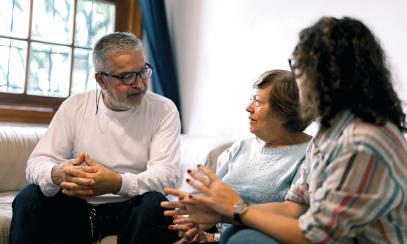
Therapy?
The Good and the Bad From a Catholic Perspective
The Good and the Bad From a Catholic Perspective
Part 1
Why is it that when your friend finds a good hair stylist, realtor, or all-around handyperson, they are probably quick to recommend them to you, but it’s much less likely they’ll approach you with, “Hey, I’m seeing this really good therapist; you should check him out”? It could be that before going to therapy themselves, they wondered, “If people find out I’m in therapy, aren’t they going to think there’s something seriously wrong with me?” Let’s look at a few of the reasons a person might be hesitant to go to therapy, starting with the one just mentioned.
“If people find out, they will judge me.” If you don’t know this already, you will learn it from any therapist who is worth their salt: Because everyone you know has free will, you have never been, are not now, and never will be in control of what anyone else thinks about you. While it’s true that some people have misconceptions on the subject of getting therapy, as a society we are chipping away at the stigma attached to reaching out for help.
“Therapy is for people who are really messed up.” Therapy is for anyone stuck in a headspace that keeps them from feeling like themselves. In my therapy office I see people of all ages and from all walks of life. On day one, the things they have in common are realizations such as “I can’t fix this,” or “I’m tired of not feeling okay,” or quite frequently, “I need some help, but I don’t know with whom I can share these things.”
“So I have problems ... doesn’t everyone?” Well, yes. As temporary residents of a fallen world, we all have problems. Knowing the difference between a problem you can work through on your own and one you might need some outside objective help with is all about the answer to this question: “To what extent is this problem affecting my daily life or functioning?” Any problem we can’t stop thinking about is keeping us from our normal level of functioning at home and/or at work, and by extension, is limiting the ways in which God can use us, or even bless us, in those arenas. A plethora of mental health professionals are ready to take you on a healing journey, but caution is key when deciding into whose therapeutic hands you’ll be putting yourself. Part 2 of this article will discuss some red flags to look for as a Catholic Christian seeking to put yourself “on the couch.”
Cathy Altonji is therapist at Catholic Family Services in Huntsville. She has a master’s degree in social work and is a licensed independent clinical social worker certified in private independent practice.

